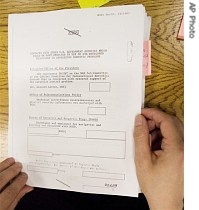2007年VOA标准英语-Experts say Recently-Released US Intelligence D(在线收听)
Washington
29 June 2007
The release of once-secret documents detailing past abuses by U.S. intelligence agencies opens a window into the sometimes dark history of the CIA. Most of the information in the documents, which date back more than 30 years, has long been publicly known. But, as VOA correspondent Gary Thomas reports, the revelations are of more than historical interest.
 |
| Central Intelligence Agency's secret documents of the agency's contacts with other US government agencies, shows some deleted portions in blank boxes, at the National Security Archives, 26 June 2007 |
CIA director Michael Hayden said the documents, although unflattering, provide what he calls "a glimpse of a very different time and a very different agency." But David Barrett, an intelligence historian at Villanova University, says that in today's war on terror some things are not terribly different in the intelligence world.
"I think that there are parallels," he said. "I think that when some decades have passed, I think we will look back at the few years after September 11 and see that there were abuses and hat there were activities which were of questionable legality. And that's sort of the view that we tend to have of the early Cold War period, the pre-'Family Jewels' period."
The 700-page dossier of memos and reports details some of the questionable and, in many cases, possibly illegal activities of the CIA, the FBI and the National Security Agency in the 1950s, 1960s, and early 1970s. They include plots to assassinate foreign leaders, including the use of mobsters to try to kill Cuban leader Fidel Castro, the domestic surveillance of political dissidents, the opening of mail, and the electronic wiretapping of American journalists.
Most of the information about the "family jewels" first came out in a New York Times report in December, 1974, which then sparked two congressional investigations and one presidential commission the following year. The dossier dealing with events some 30 to 40 years ago that was just released still has large portions blocked out.
Amy Zegart, professor of public policy and an intelligence specialist at the University of California at Los Angeles, says how a president wields the power of intelligence agencies remains as much an issue now as it was then.
"Democrats and Republicans, Cold War, terrorism - it doesn't matter," she said. "All presidents are tempted to go beyond the bound of what most Americans consider to be appropriate in their use of intelligence agencies. So there's this ongoing tension between what presidents see as protecting the national security interest, and what most Americans view as violating basic civil liberties. And we see that in the 1960s, and we see that today."
The original investigations of the "family jewels" led to the reforms, including the creation of permanent intelligence oversight committees in Congress. Britt Snider, who was counsel to the Senate committee investigation in 1975, says that oversight became somewhat lax in intervening years.
"Well, I think there certainly was a period here, a recent period, when there was more deference paid to the intelligence community and what they were doing, not as much oversight," he noted. "Certainly in terms of public oversight there was not a whole lot going on for, I don't know, almost probably 10-year period. But I think it's started to change now. I think both committees are becoming more active and getting back to the way they used to be."
There are those who say the changes imposed after the first revelations went too far. Former CIA officer Peter Earnest, who how heads the International Spy Museum in Washington, points out that barriers on information sharing that were erected between America's domestic and foreign intelligence agencies in the 1970s may have affected the chances of intercepting the 9/11 plot.
"When the 9/11 Commission met, they were concerned about, you remember the issue of the 'wall' came up. In other words, there was certain information that couldn't be shared. In other words, not only were we perhaps not collecting the right dots, we were unable to relate the dots to each other because of the so-called wall," he explained. "So it addresses that issue of did we go too far at times, and the pendulum swings back, and now we have to correct in the other direction."
However, David Barrett, who has written a book on the relationship between Congress and the CIA, doubts that the so-called "information wall" can be blamed for the failure of inter-agency cooperation before September 11, 2001.
"I think it had much more to do with the different cultures, the distinct cultures, each agency wanting to do things its way - FBI wanting to do things its way, CIA wanting to do things its way," he added. "So there are reasons why agencies didn't perform especially effectively in the lead-up to September 11th. But I don't think it had to do with these intelligence reforms of the 1970s. I just don't buy it."
UCLA's Amy Zegart applauds the release of the "family jewels," saying it is long overdue. But she says there is still much that the intelligence community is keeping locked up that should be aired.
"I think we have to be careful about congratulating the CIA too soon about its glasnost [openness]," she said. "There's a lot that remains locked up that could shed tremendous light on what led to 9/11 and how we could make the intelligence community work better."
The "family jewels" outline how the CIA and NSA engaged in electronic eavesdropping and wiretapping decades ago. The White House and Congress are currently locked in a struggle over documents - or, perhaps in these Internet days, emails as well - relating to the warrantless wiretapping program that the Bush administration ordered the National Security Agency to carry out after 9/11.